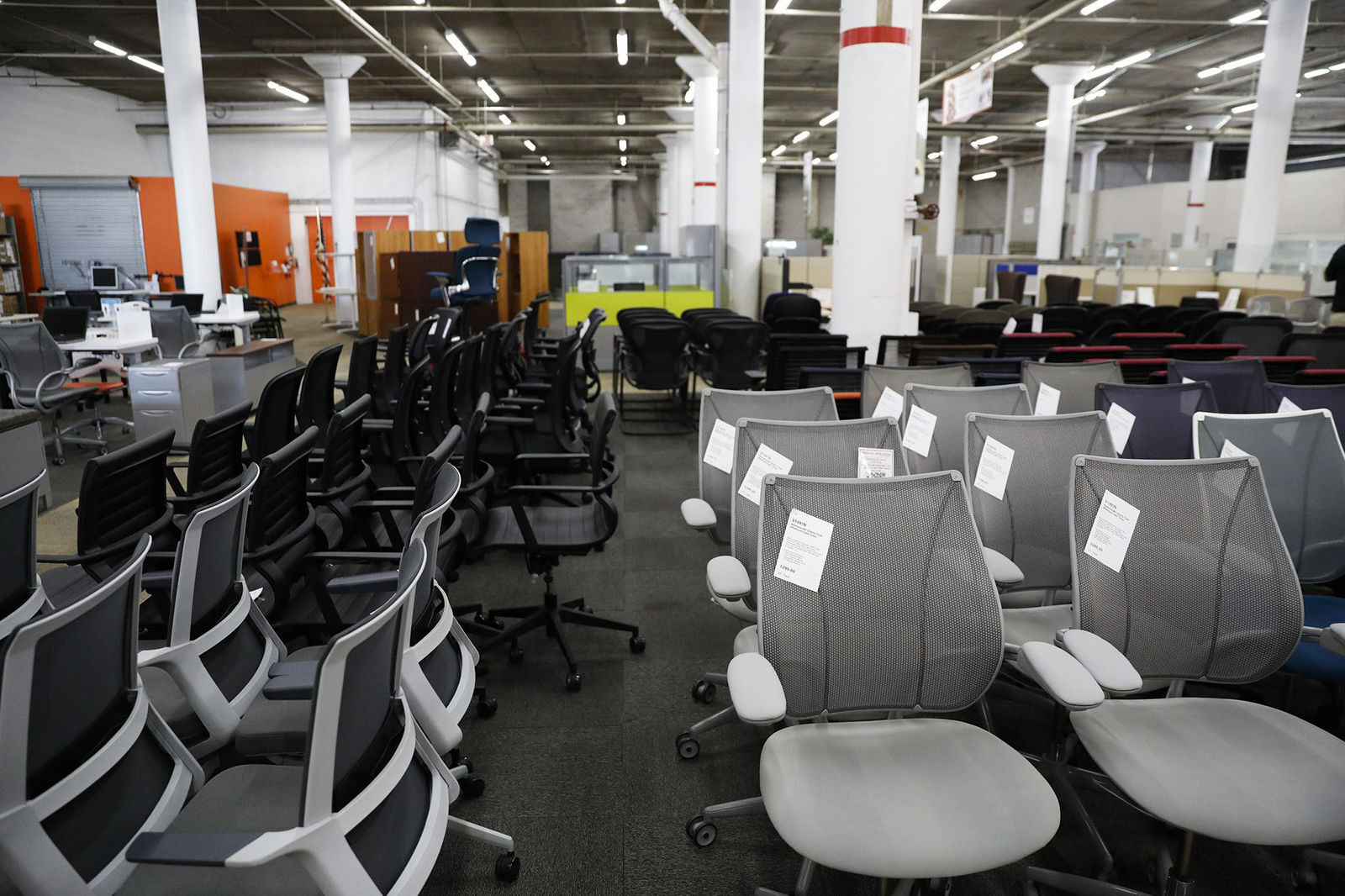CHICAGO — Before COVID-19 sent most workers home in March, office furniture resellers took orders for dozens, hundreds or even thousands of items at a time.
But in recent months, many of these businesses instead have been besieged by the weary work-from-home masses who are snapping up one refurbished desk and chair at a time, wrestling the goods into their cars and dragging them home.
It’s one of many examples of business models changing because of the public health crisis, and it’s an indication that office workers are hunkering down for a much longer stint at home than they initially expected when the office market all but shut down eight months ago.
Rework Office Furniture in Chicago has seen noncorporate walk-in and online orders increase to about $100,000 per month, from a pre-pandemic monthly average of $3,000, said Mark Knepper, one of the company’s owners. Business has picked up significantly since August.
“It took that long for people’s backs to hurt, and for people to realize they could be sitting in the kitchen for a long time to come,” Knepper said. “That’s when a lot of companies started offering stipends.”
Adding to the demand are students learning from home, furniture sellers say.
In normal times, companies such as Wurkwel Ventures, Office Furniture Center’s parent, provide a range of services — such as decommissioning offices, relocation services, refurbishing, and selling new and used office furnishings — that accompany office relocations.
With no clear date for the widespread return of workers to their offices, many tenants are opting to stay in place on short-term renewals, or even do without an office location for now, as leases expire.
Direct-to-consumer sales are creating a new source of revenue for office furniture sellers. But for most industry players, home office business isn’t enough to offset the loss of revenue from huge corporate deals.
The sprawling showroom has seen walk-in business triple and its online business soared to 962 orders in September — compared with 40 sales in the same month last year. Some corporations are creating accounts that allow their workers to choose a desk and chair and have it bill directly to their employer, said Mason Awtry, CEO of Chicago-based Wurkwel.
“We have seen walk-in traffic increase dramatically during the course of the pandemic,” Awtry said. “A lot of that is the need for people to set up a home office. This is the used furniture economy.”
Chris Farrar, a marketing director for software firm CDK Global, already was planning to build a home office in his Batavia, Ill., basement before the pandemic. He accelerated those plans after months working from home, with four sons learning remotely during part of the school week.
“I was working from the couch in the living room,” Farrar said. “It sucked. It got to where I had to go outside for calls.”
Farrar, who has been to his company’s headquarters twice since mid-March, recently completed an enclosed office in his basement. He ordered a desk, chair and mat from suburban office furniture seller Arthur P. O’Hara Inc.
By eliminating his commute and chitchat with co-workers and making lunch at home, Farrar said his productivity has increased.
Marketing freelancer Mariam Staunton ordered two sit-to-stand desks and a Herman Miller chair from Rework delivered to her Chicago home in the spring, soon after downtown office buildings began clearing out.
Although she primarily works from an office in her house, Staunton said the pandemic took away the option of working from clients’ offices.
“I worked on a long-term engagement with a client based out of the Mart, and it was a great setup with a height-adjustable desk,” Staunton said. “Being at home full-time made me realize I wanted something similar.”
With the retail market facing widespread vacancies because of COVID-19, and with home offices booming, Rework is in talks with landlords to create several office furniture pop-up stores throughout the Chicago area, Knepper said.
Rework is part of Chicago-based 226 Companies, whose affiliated businesses have seen a slowdown in corporate clients making decisions on new spaces, he said. Revenue from corporate projects is down 30% during the pandemic, Knepper said.
“I think there’s a world of opportunity,” Knepper said. “Whenever there is change, there’s an opportunity for innovation. People are going to be working from somewhere.”
Other companies, like Downers Grove, Ill.-based Arthur P. O’Hara and Milwaukee-based Office Furniture Resources, have seen their direct-to-customer business has doubled. Yet those types of transactions do not offset the loss of corporate business and both companies have laid off some employees in the Chicago area.
Corporate deals keeping the company busy have more to do with reconfiguring existing offices, such as with more spacing and taller barriers, than with office relocations or expansions, said Mike Slattery, president of Arthur P. O’Hara.
Experts say companies are likely to have a mix of workers in the office and at home on any given day, creating a need for flexible office spaces. There is likely to be more spacing and more barriers, meaning there could be a move away from benching and other open layouts that gained popularity in recent years, and perhaps a move back toward more walls and cubicles.
In fact, one page on Office Furniture Center’s website is titled “Cubicles — the future of workplace design (again).”
Design changes could affect how materials are reused by other office tenants.
“When we bring in all these old cubicles, they’re really tall,” Knepper said. “We’ve got a guy who, all he does it cut down panels to put them into the modern office.
“In recent years we’ve been cutting them pretty short. I have a feeling we may not be cutting them as short.”
Industry players don’t know how soon their traditional business will return to normal, or what offices will look like post-pandemic.
“There’s a lot of business owners who don’t know what to do,” Awtry said. “We’re still in a limbo stage.”


